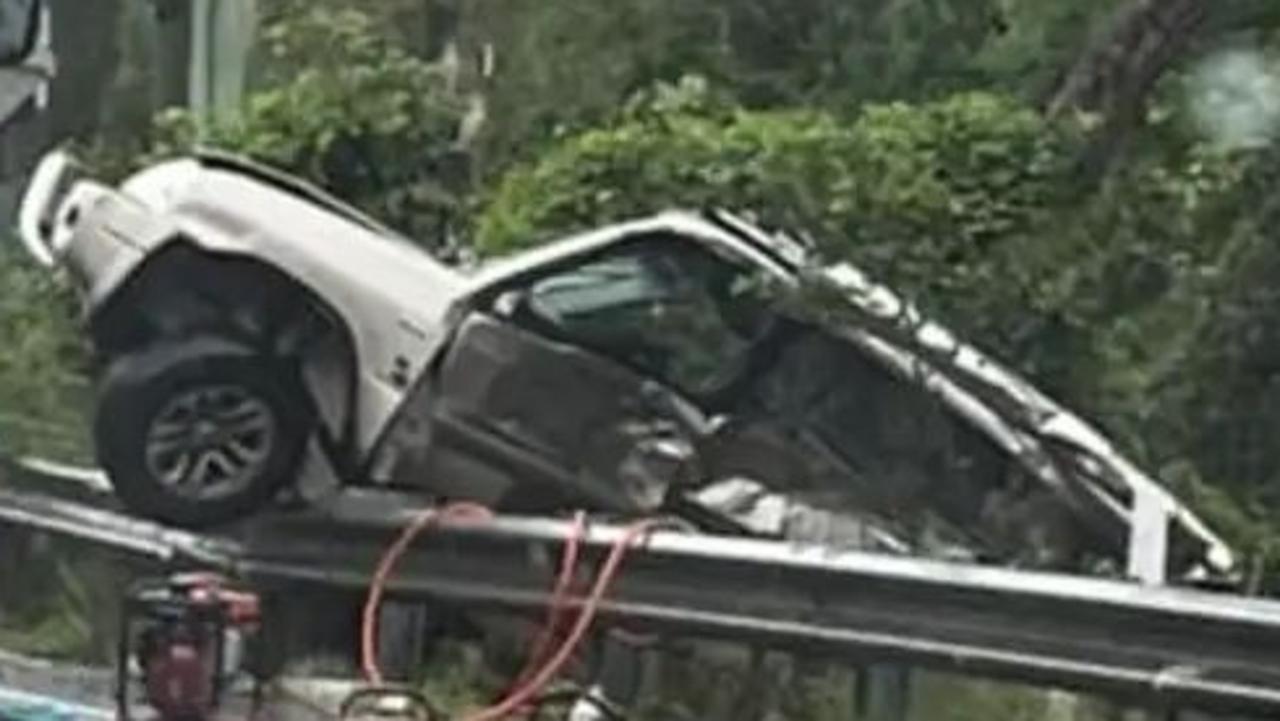Wieambilla inquest Day 7: Audio reveals police negotiator’s desperate pleas with Trains
Dramatic audio has been played of the final moments before specialist police, who pleaded with a trio of Doomsday cop killers to drop their weapons, shot them dead. FOLLOW LIVE
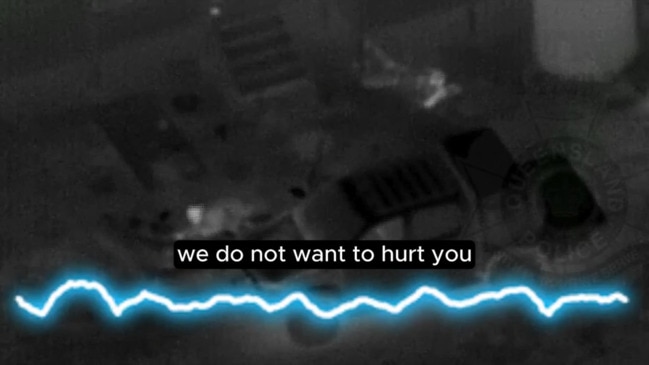
QLD News
Don't miss out on the headlines from QLD News. Followed categories will be added to My News.
Dramatic audio has been played of a police negotiator’s relentless efforts to get a trio of conspiracy theorists to drop their weapons and surrender.
Senior Constable Will Goodwin was one of two police negotiators inside the heavily armoured BearCat during the Wieambilla massacre and used a loudspeaker to plead with Nathaniel, Gareth and Stacey Train to lower their rifles.
A marathon inquest into the murders of police constables Rachel McCrow and Matthew Arnold and good Samaritan Alan Dare is in its second week.
The two constables were killed by conspiracy theorists Nathaniel, Gareth and Stacey Train as they walked along the long dirt driveway.

Constables Keely Brough and Randall Kirk managed to escape under fire.
The four officers were there to conduct a missing persons inquiry but instead were ambushed by the Trains, who had set up sniper hides to lay in wait for police.
Neighbour Mr Dare was killed by the Trains when he saw smoke coming from their property and came to investigate.
Nathaniel had been reported missing with NSW Police, who had asked their Queensland counterparts to look for him at the property of his brother Gareth.
Stacey, who had previously been married to Nathaniel, later married Gareth and they bought the bush block in 2015.
The inquest heard that up until minutes before she was shot by a Special Emergency Response Team sniper, police were still unsure whether Stacey was “hostile” and even discussed whether she was being held hostage by Nathaniel and Gareth.
But the hostage theory was at some point ruled unlikely when Stacey was observed by officers hugging one of the other gunmen.
Sen Const Goodwin said he made his first attempt over the loudspeaker as the BearCat made its way down the driveway at 9.15pm.
“To the occupants of 251, this is the police. Nathan, Stacey and Gareth, guys we need you to stop firing your weapons,” he could be heard saying in the audio recording.

“Nathaniel, Gareth and Stacey, this is the police. Guys we need you to put your firearms down. Put your weapons on the ground. For your safety, we need you to follow these instructions, guys. Put your weapons down on the ground and listen to instructions given to you by police.”
The audio then captured SERT operatives in the BearCat shouting instructions to the driver after the Trains responded to negotiation attempts by shooting at them.
The inquest heard the BearCat was forced to reverse back down the dirt driveway to escape gunfire.

“Left hand down, get back on the track,” one of the operatives said.
“Continue, continue, left hand down, left hand down.
“Continue, continue, right hand down. Harder. Harder. Straighten up, straighten up. Right hand down a little bit. OK we are on the track. Straight. Straight back.”
The audio segment concluded with one of the operatives commented on the accuracy of the gunmen firing at them.
“They can obviously shoot,” he said.
A second audio segment captured Sen Const Goodwin’s further attempts a minute later.
“Nathaniel, Gareth, Stacey – guys we need you to stop shooting at police,” he was captured saying.

“For your safety, put your weapons down. I don’t want to see anyone get hurt today guys. You need to stop shooting at police.
“I can’t guarantee your safety if you keep shooting at us.
“This is the police. Lay down your weapons guys and listen to instructions given by police.
“No one is here to hurt you guys but I cannot guarantee your safety if you keep shooting at us.”
The inquest heard the BearCat was forced to reverse back to the property’s main gates, far from the house, after multiple shots hit its windscreen.
No shots had been fired from SERT operatives at that point in time.
In a third recording, the negotiator attempts to speak directly to Stacey moments after her husband Gareth is shot and killed.
“(To the) female in this building,” Sen Const Goodwin said over the loudspeaker.
“Place your hands up and weapons down. Weapons down, hands up.
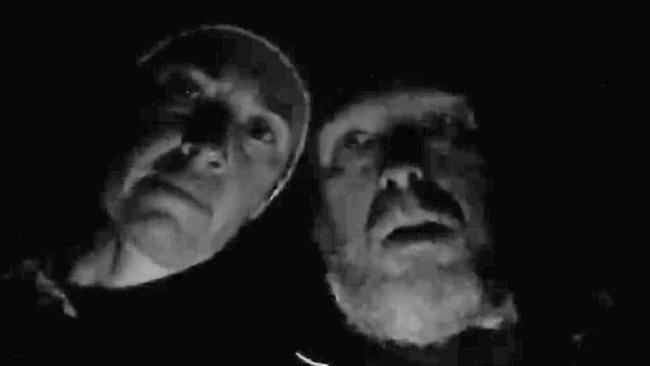
“Listen to these instructions and you will be OK. We cannot guarantee your safety if you do not listen. Place your weapons down. I repeat. Place your weapons down and hands up.”
The audio captured SERT operatives shouting about the movements of Nathaniel, who they referred to as POI2 (person of interest).
“POI 2 is reloading, he’s moving up. He’s up. POI 2 is up.”
A fourth recording captured Sen Const Goodwin’s final efforts to negotiate the surrender of Nathaniel after Stacey was shot and killed.
“Listen to these instructions and we can guarantee your safety. Place your weapon down. I repeat, weapon down, hands up,” the officer could be heard pleading with Nathaniel.
“Mate it doesn’t have to be this way, we don’t want to hurt you.
“Weapons down and your hands up. That’s all it has to be.
“Weapon down and hands up mate and we can help you.
“Place the weapon down and your hands up.
“We do not want to hurt you.
“Listen to these instructions mate. Listen to them and we can help you.
“Place your weapons down and hands up.
“Hands up, show us your hands mate, take your hands off the weapon and show us your hands. That’s all you have to do.”
The recording ended with a SERT operative screaming from the BearCat.
” … YOU BEHIND THE COUCH - SHOW ME YOUR HANDS.”
Nathaniel is shot and killed moments later.
SEVEN MINUTES, THREE FATAL HEAD SHOTS
The commander of the elite Special Emergency Response Team at the time of the Wieambilla massacre has told an inquest that the three doomsday killers were killed within seven minutes of each other with shots to the head.
Superintendent Tim Partrige, who was a SERT Inspector in December 2022, agreed all three Trains were killed by SERT operatives with shots to the head.
The inquest heard Gareth was killed at 10.32pm while firing at the team three light armoured vehicle, Stacey at 10.36pm while shooting at the BearCat and Nathaniel at 10.39pm while also firing at the BearCat.
He said it was appropriate to take head shots because the Trains needed to be “instantly incapacitated” to reduce the danger to SERT officers.


He said while general duties officers will aim for “centre mass” to stop an offender, SERT operatives had a much higher level of training and more accurate weapons.
Supt Partrige said there had been cases where offenders had been fatally wounded from a shot to the centre mass but had been able to continue to fire more rounds before succumbing to their injury.
“If you don’t achieve instant incapacitation then you won’t stop the threat as quickly as you can,” he said.
“If I was a SERT operator in the BearCat – or out of the BearCat as was the case towards the end of that engagement – I would have taken a head shot also, as it was the only way to guarantee instant incapacitation.”
MOST HIGH RISK JOB IN SERT’S HISTORY
Supt Partrige said he believed the job was the most high risk in SERT’s history.
“In terms of the danger to SERT operators, due to the number of offenders, the heavy calibre weapons that they had and amount of ammunition that they had access to, the preparation that had been undertaken for police arrival – none of which we were aware of at the time – and their intents, motivations to kill police, it’s my view that the SERT response to the Wieambilla incident was the most dangerous operation SERT has ever been involved in, certainly in my experience,” he said.
“The risk to SERT operators was extreme.
“I felt there was high risk, a high likelihood that we would lose a SERT operator during that response.
“The SERT operators delivered exactly what I asked them to deliver. There was not a moment’s hesitation, there was not any query, they did exactly what I asked them to do, exactly when I asked them to do it.
“As their superintendent now I’m incredibly proud of what they did that night.
“There was a very good chance someone would be shot and killed and yet nobody, not one of them, hesitated,” he said.
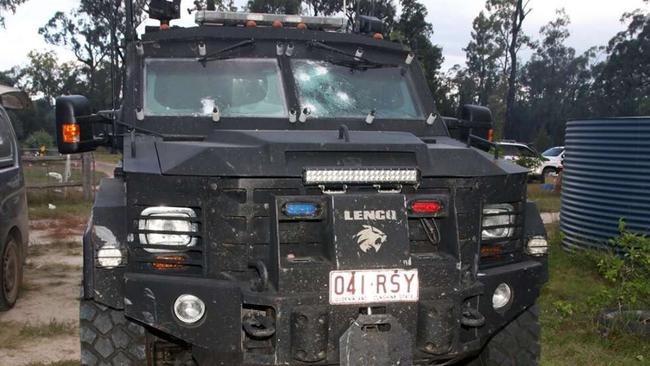
During the incident he said SERT operators spoke to Polair but only on a local communications channel which was potentially compromised after the Trains had taken the radios from constables McCrow and Arnold.
The other SERT operators spoke to each other on SERT direct communications, between their radios, with one another, which was not compromised, he said.
Supt Partrige said it was frustrating to have the communications issues and he would have liked to have had a greater ability to hear what was happening on the ground and communicate more freely.
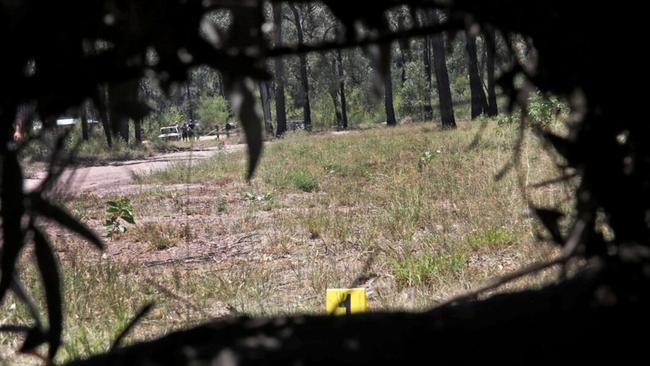
He said at one stage he had to make a telephone call from the command post to team leaders.
Since the incident the specialist response group has improved communications systems.
Supt Partrige said he had since recommended Queensland acquire aircraft that had the capability to carry snipers who can fire from the air.
He said while his operatives were trained and capable of doing so, the aircraft police had access to were not set up to accommodate this.
“Had we been able to put a marksman in an aircraft (at Wieambilla), that would have substantially reduced the risks to SERT operatives in this instance,” he said.
“That capability exists in other states (but) due to a variety of factors, due to the size of Queensland, it’s expensive and it’s a large undertaking.”
He said his operatives would continue to “maintain the skills required (to shoot from the air) hoping that the capabilities of the aircraft will catch up with us”.
WHO SHOOTS COPS AND JUST WAITS?
Supt Partrige said when he was first briefed about the job he was told about an “association with NSW”, relating to Nathaniel’s missing persons inquiry. He was also aware about vehicles on their property.
“And my immediate thoughts were they were going to be heading to NSW, it wasn’t far from the border,” he said. “I thought they were going to be going mobile.
“Who shoots police and just sits there and waits?” he said.
“(I was thinking) This is going to be a mobile response. We’re going to have to find these people on the road and take them out in vehicles.
“So right from the very outset I was concerned about our ability to isolate the threat from the public.

“The fact that a civilian had also been killed, it wasn’t just police, elevated that concern in my mind and emphasised the criticality of isolating the threat from other members of the public.”
Supt Partrige said it was a relief when police had confirmed the Trains were still at the house.
He said he signed the handover form at the police forward command at 9.05pm, taking over the inner cordon.
He said at the time he still wasn’t completely satisfied with containment positions.
“For a significant period of the incident I remained concerned about the ability of the Trains to get in a vehicle and breach the cordon,” Supt Partrige said.
“I continued to express my command desires to the tactical commander and to the SERT team leaders and impress upon them the need to move forward into positions which I felt guarantee me containment and guarantee me the Trains would not be able to leave by either vehicle or by foot.”
After the containment, at about 9.10pm, negotiation attempts commenced with the Trains. However the Trains’ phones were off. Negotiators then attempted to speak to the Trains via a loudspeaker from the BearCat but the two brothers responded by firing on the vehicle.
SERT'S RAPID RESPONSE TO MASSACRE
Supt Partrige said he was at work when he answered a phone call about a “rumour” that police officers had been shot at a rural property.
He said his operatives were on the road within 10 minutes and that he organised for two snipers to travel to the Western Downs by helicopter.
He said he immediately called the state duty officer at police communications to see if it was true and whether the assistance of SERT was required.
Supt Partrige told the inquest he spent an hour mobilising teams and attempted to put operatives into two helicopters before he himself drove to the police forward command post.
He said he was able to secure air transport for four SERT personnel – two snipers, a tactical commander and a team leader.
He said his own departure was delayed while he tried to get a second helicopter to take more SERT officers.
“I wanted long arms on the ground because of the rural location,” Supt Partrige said.
He said the heavily armoured BearCat was deployed as quickly as possible, as well as other light armoured cars.
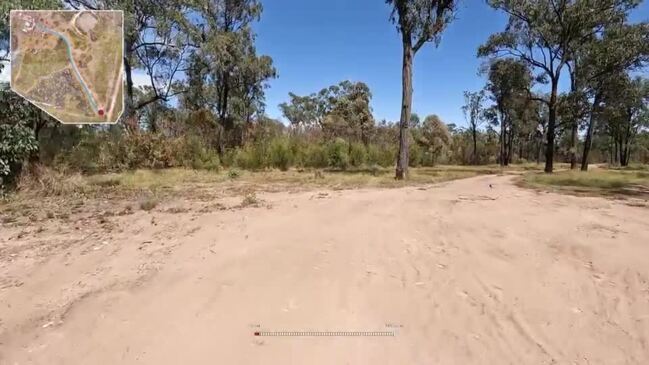
“We have a prearranged template that we just make the telephone calls and those staff start to materialise,” Supt Partrige said.
Supt Partrige said he drove a car to Wieambilla with two intel officers. On the way, he was provided updates as to the situation on the ground.
He said on the way, he was told the bodies of the two officers had been recovered by local officers, who had also rescued Constable Brough.
“Therefore SERT priorities then changed … to containing the incident and arresting the persons of interest,” Supt Partrige said.
He said when he arrived at the forward command post, the BearCat and other SERT vehicles were there and ready to move forward onto the property.
After he had been given a brief of the situation unfolding Superintendent Partrige said he was of the belief it was a “highly risky situation”.
“I was more concerned about the threat to the public and I wanted to ensure that the POIs (persons of interest), the offenders, were not able to leave that area,” he said.
“That we were able to pin them down essentially and isolate that threat from the public.”
A SERT member, known as operative 238, said on the way to the Wieambilla incident they looked up information on the Trains and could see Nathaniel was a registered firearms holder and there had an outstanding warrant which related to possession of firearms. Another officer also made checks interstate about Nathaniel.
“We did checks with the military to ascertain if Nathaniel or any of the other residents at the address had previous military training,” operator 238 said.
“It’s quite pertinent for the officers because it demonstrates some level of proficiency in weapons and what that would potentially mean for those officers responding.”
More Coverage
Originally published as Wieambilla inquest Day 7: Audio reveals police negotiator’s desperate pleas with Trains




